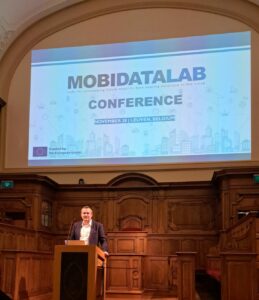MobiDataLab has investigated the business and revenue models based on Data sharing, to define how to retrieve benefits from it.
The purpose of the deliverable D3.4 Data sharing business and revenue models is to provide a framework to support stakeholders to take advantage of the data produced from the transport network and improve their operations and services.
For the stakeholders interested in enhancing their data sharing products and services, the deliverable compiles a set of business and revenue models through the Future Transport Cloud (FTC).
But first, what is the FTC exactly?
In short, the FTC will provide Findable, Accessible, Interoperable and Re-usable (FAIR) data. This data will be used by the data consumers to support short term and real time decisions (transport modes organisation) and medium term decisions (such as urban planning).
Furthermore, the FTC will aggregate, combine, consolidate, and access data coming from different platforms by ensuring that each of them can maintain or improve its business model. (Public and private transport companies, Ticketing services, Mapping services, Third-parties companies such as Weather companies).

So, how to create revenue in the FTC?
MobiDataLab partners have conducted an extensive research on the possible business models for the FTC. The choice of the business model is also strongly influenced by the legal structure which supports the FTC.


From the litterature review and the Benchmark, we have concluded on 5 possible business models archetypes for the FTC.
- Open data & Open source
- Two-sided (advertising or sponsorship)
- Marketplace
- Software as a service
- Barter
Through interviews and workshops, these models have then been analysed in terms of feasibility, attractiveness, advantages, drawbacks and pre-requisites. A comparaison was established. We can conclude on 4 main insights:
- Business models of the FTC are dynamic and agile.
- The Business model of the FTC is likely to be a mix between several archetypal business models.
- According to local specificities, different business models may be implemented.
- Business models are perceive differently according to stakeholders.
Data sharing and acquisition methods or models are part of the business model. A lot of research conclude on the difficulty to implement sharing at scale. Studies designed to understand better the barriers and motivations to share are useful to contribute to designing business models which would reduce the barriers and foster the motivations. A data sharing solution should either increase the benefits or reduce the transaction costs in order to increase the likelihood of sharing. As a synthesis, three data sharing models exist and differ on four dimensions:
- The type of data than can be shared (data privacy, commercial constraints)
- Who can access the data (businesses, academics, public authorities…)
- Terms of use (e.g., commercial gain or research purpose)
- Terms of payment

Concerning the legal structure which supports the FTC, we have adressed that question in the scope of the possible business models previously shared. 4 possible legal structures have been identified:
- Commercial entity
- Data Trust
- Joint venture
- Association
As the business model choice is influenced by the legal entity, a level of fit between them is available on p33 of the deliverable.
Our goal on in this study was to provide an analysis to the stakeholders in the ecosystem to develop a specific business model. It has also give us some strong insights on the appropriate perimeter for the Future Transport Cloud business model.
FIND OUT MORE IN OUR DELIVERABLE AT THE PUBLICATIONS SECTION!




